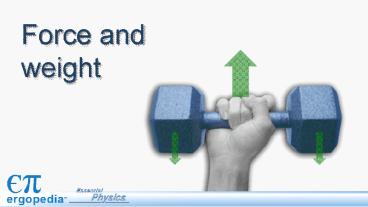Force and weight PowerPoint PPT Presentation
1 / 19
Title: Force and weight
1
Force and weight
2
Explaining motion
- Isaac Newton was the first person to explain WHY
objects move the way they do. - He based his laws of motion on two key concepts
- mass
- force
3
What is mass?
All matter has mass and takes up space. A solid
rock has mass. So do gases and liquids. With
your hand out the window of a moving car, you
feel the mass in the air pushing against you.
4
Measuring mass
The SI unit for mass is the kilogram. This
object has a mass of 2 kilograms. Kilogram
video
5
What is force?
The concept of force What is force video.
6
What is force?
The concept of force A force is a push or a
pull.
7
What is force?
The concept of force A force is a push or a
pull. Forces can cause an object to change its
motion. Can you give some examples of forces?
8
Types of forces
The concept of force A force is a push or a
pull. Forces can cause an object to change its
motion. Can you give some examples of forces?
Examples of forces
- weight
- friction
- tension from rope
- force from a spring
- electric force
9
Units of force
Quantitative Force is measured in newtons.
10
Units of force
11
Weight is a type of force
Weight is the force of gravity acting on objects
with mass.
How is weight different from mass?
Weight vs Mass Video
12
Weight vs. mass
Mass is an intrinsic property that measures the
quantity of matter in an object.
- Your mass does NOT change if you go into space.
13
Weight vs. mass
Mass is an intrinsic property that measures the
quantity of matter in an object.
- Your mass does NOT change if you go into space.
- Weight is an extrinsic property that depends on
the gravity force. - Your weight changes if you go into space. Your
weight depends on your location.
14
Weight vs. mass
Mass is a scalar quantity. It has a magnitude
(such as 60 kg), but no direction. Weight is a
vector. It has magnitude AND direction. For
objects on Earth, it always points straight down
toward the center of the Earth. Also, known as
the Force of gravity.
Fg
15
Weight and mass
Whenever you know the mass of an object, you can
calculate its weight.
Whenever you know the weight of an object, you
can calculate its mass.
16
Assessment
- If you take a trip from Earth to the Moon, which
statement below is correct? - Your mass and weight both decrease.
- Your mass stays the same and your weight
decreases. - Your mass decreases and your weight stays the
same. - Your mass increases and your weight decreases.
17
Assessment
- If you take a trip from Earth to the Moon, which
statement below is correct? - Your mass and weight both decrease.
- Your mass stays the same and your weight
decreases. - Your mass decreases and your weight stays the
same. - Your mass increases and your weight decreases.
18
Assessment
- What is the weight of this dumbbell, in newtons?
A 10 kg dumbbell is resting on a table partly
supported by a spring that pulls upward with a
force of 50 N.
19
Assessment
- What is the weight of this dumbbell, in newtons?
Fg mg (10 kg)(9.8 m/s) 98 N
98 N

